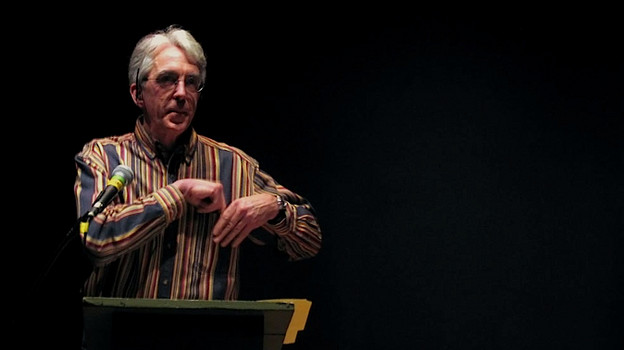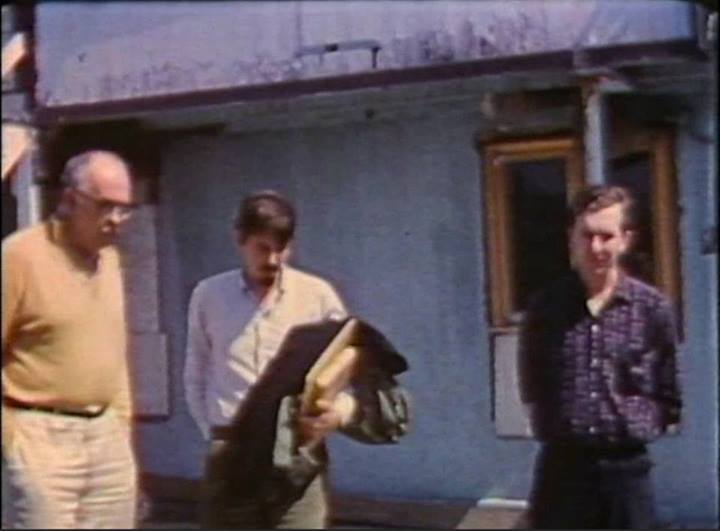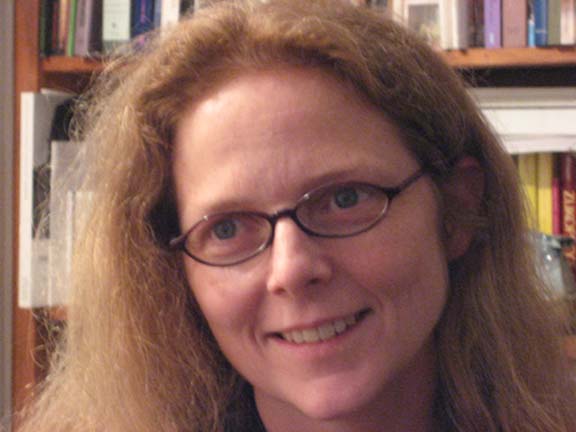|
|
Posted 1/7/2014 (link)
 Today we released the seventy-third episode in the PoemTalk Podcast series — which focuses on a 2003 Segue Series performance by Steve Benson at the Bowery Poetry Club that would eventually be published as "Did the lights just go out?" in 2005's Open Clothes. For this program, host Al Filreis was joined by a panel that included Patrick Durgin, Thom Donovan, and Tyrone Williams.
Filreis' write-up of this episode on the PoemTalk blog begins with Williams' observation of "a similarity to the 'talk poems' of David Antin (although acknowledging their different ideas about improvisation): for each it is important to understand how entering a room, unprepared, leads to work that comes from reacting to the space and particular environment. The relation between a text and the space in which it is performed is always a significant matter, but never more so than in this unpredictable mode." He also makes mention of several responses to Benson's work in this mode — including a similar performance a few days later at our own Kelly Writers House that also was documented in Open Clothes — that have appeared in both Jacket and Jacket2. You can read the rest of his introduction on Jacket2.
PoemTalk is a co-production of PennSound, the Kelly Writers House, Jacket2 and the Poetry Foundation. If you're interested in more information on the series or want to hear our archives of previous episodes, please visit the PoemTalk blog, and don't forget that you can subscribe to the series through the iTunes music store.
Posted 1/9/2014 (link)
 Through the end of December, many of us anxiously followed the condition of the legendary Amiri Baraka, who'd been hospitalized for unstated reasons, and were heartened to hear that he was getting better and had been released. Today comes the sad news that Baraka has passed away at the age of 79.
No doubt the many obituaries and tributes to come will highlight Baraka's divisive nature, and it's true that to this day the mere mention of his name can stir up controversy, but I'd prefer to remember him as a unifying figure. As editor of both Yugen and Totem Press with Hettie Jones, and The Floating Bear with Diane DiPrima, Baraka served as a central nexus for the overlapping worlds of the Beat Generation, the New York School, the Black Mountain Poets, and San Francisco's poetry scene, while also welcoming outside authors like Hubert Selby, Jr. into the fold. As a captivating writer on music, as well as a performer, he drew casual listeners into the literary mode, and as a prolific author of poetry, drama, fiction, and criticism he brought readers across the boundaries of genre, broadening their worldview in the process. Finally, as highly-visible figure in the Black Arts Movement, Baraka championed the legitimacy of African-American culture as the civil rights movement sought changes in the social sphere.
PennSound's Amiri Baraka author page is home to a modest collection of recordings spanning five decades, from a pair of powerful readings by a young LeRoi Jones in the mid-1960s to a 2007 appearance on Cross Cultural Poetics. To start exploring, click here.
Posted 1/13/2014 (link)
 Sadly, Amiri Baraka was not the only noteworthy poet to pass away last week, and we wanted to make sure that Madeline Gins also received proper attention. Our own Charles Bernstein has posted a tribute to the "poet, architect, and long-time collaborator with the artist Arakawa" on Jacket2:
Madeline Gins, a poet, architect, and long-time collaborator with artist Arakawa, died this morning. She was 72. The cause of death was cancer.
Gins lived all her life in New York, much of it with Arakawa on a loft on Houston Street. She graduated from Barnard College (1962), where she studied physics and Oriental philosophy. She was also a graduate of the High School of Music and Art. Her first book, a work of conceptual fiction, was Word Rain (1969). She went on to publish several other books of poetry, including What the President Must Say and Do (pdf) and her magnum opus, Helen Keller or Arakawa. With Arakawa, she created the masterpiece The Mechanism of Meaning, a philosophical investigation of the relation of words to meaning. They also published two other works of philosophical and architectural speculation: Architectural Body and Making Dying Illegal.
Gins met Arakawa in 1963. Arakawa died in 2010, at the age of 73. Together, they designed and built residences and parks: Site of Reversible Destiny-Yoro Park (1993-5; Gifu Prefecture, Japan), The Bioscleave House (2007; East Hampton, NY), The Reversible Destiny Lofts—Mitaka (2005; Mitaka Japan), and Gins's last work, the Biotopological Scale-Juggling Escalator for Dover Street Market in New York (December 2013). Their architectural projects formed the basis of the 1997 exhibition "Arakawa + Gins: Reversible Destiny" at the Guggenheim Museum SoHo. In 1987, they founded what was to become the Reversible Destiny Foundation.
Posted 1/16/2014 (link)
Posted 1/21/2014 (link)
 On November 10, 2013 the Brooklyn Rail's Phong Bui curated the performance "Oh! Sandy: A Remembrance" as part of the Come Together: Surviving Sandy exhibition at Industry City, Brooklyn. The event featured sets by Paolo Javier, Tan Lin, Vincent Katz, Anne Waldman, Matvei Yankelevich, Tonya Foster, Tracie Morris, Charles Bernstein, erica kaufman, Elizabeth Willis, Bob Perelman, Anselm Berrigan, LaTasha N. Diggs, and Nada Gordon, with each poet's work reflecting on the superstorm and its far-reaching implications. The recording comes to us courtesy of Clocktower Radio and the Brooklyn Rail.
Posted 1/23/2014 (link)
 Today we have a tremendously exciting new addition to the PennSound archives — "Robert Creeley and Company: Home Movies by Bobbie Louise Hawkins." Charles Bernstein provides background information on the films in a new post on Jacket2, along with a timetable of its contents:
"Bobbie Louise Hawkins took these home movies from 1962 to 1965. She provided them to Robert McTavish for his film about the Vancouver poetry conference of 1963, The Line Has Shattered (2013), and then asked McTavish to send them to PennSound. Penelope Creeley and McTavish provided most of the annotations. We welcome any further identifications: let us know!"
At left, we see a screenshot of Charles Olson, Robert Creeley, and John Wieners; other captures Bernstein has selected from the films include Allen Ginsberg, Olson and Robert Duncan, Wieners, and John Cage. You can see them here and watch the films here.
Posted 1/28/2014 (link)
 Today is the seventy-fifth anniversary of the passing of William Butler Yeats, and to mark the occasion, it's worth revisiting the recordings housed on his PennSound author page.
First and foremost, there are eight tracks of the poet himself, taken from various sources and recorded between 1931 and 1937. "The Lake Isle of Innisfree" is best represented here, with three separate renditions (from 1932, 1936, and 1937) plus a brief track of Yeats discussing the poem in 1932. Other tracks include two stanzas from "Coole and Ballylee," "The Fiddler of Dooney," and "The Song of the Old Mother," plus a six-and-a-half minute track from 1936 in which Yeats discusses modern poetry.
You'll also find three readings by John Trimmer — of "The Wild Swans at Coole," "Leda and the Swan," and "Sailing to Byzantium" — along with a link to PoemTalk Podcast #66 from this past May, in which Taije Silverman, Max McKenna, and John Timpane joined Al Filreis to discuss "The Lake Isle of Innisfree."
Posted 1/30/2014 (link)
 We recently segmented a number of recordings by Elizabeth Willis and wanted to be sure our listeners didn't miss out on them.
The earliest of these newly-split recordings is Willis' March 1993 Segue Series Reading at the Ear Inn, where she read "The Human Abstract," "Second Law," and "A Maiden." Jumping a few weeks forward in time, we have Willis' set as part of the New Coast Festival in Buffalo, where her set included part two of "AO," an excerpt from The Human Abstract and "Songs for A." Staying in Buffalo, there's a November 1994 set as part of the Wednesdays at 4Plus series, that covers much of the same territory as the previous two recordings, while adding titles like "Envoi," "The Relation of the Lion to the Book is the Number 5," and "Bee Island."
Finally, from 2008 we've broken up both Willis' Segue Series set at the Bowery Poetry Club — where she read "Vernacular Architecture," "A Species is an Idea," "Yesness Park," "Elegy for Robert Creeley," and "Still Life with Tornado," among others — and her two-part appearance on "Close Listening", including individual tracks for the reading episode and a thematic segmentation of her conversation with host Charles Bernstein.
|
PennSound Daily archive
2023
2022
2021
2020
2019
2018
2017
2016
2015
2014
2013
2012
2011
2010
2009
2008
2007
|








